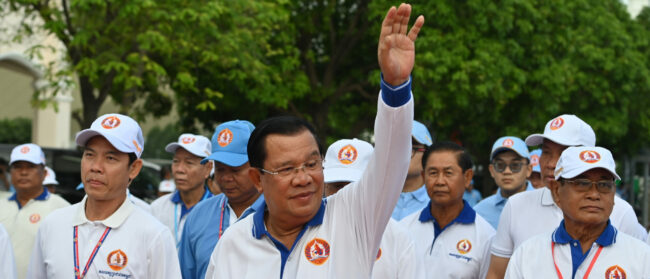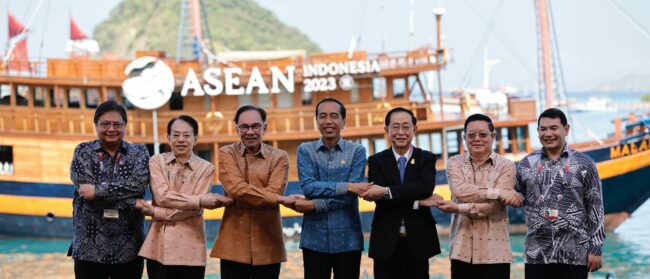Un Raksmey and her husband were both widowed with two and three children each before they met and began a life together along a dusty road on the outskirts of the Cambodian tourism capital Siem Reap.
They built a rustic house with corrugated steel on a small plot of land that they’d bought in 2008. There, they began selling everyday products to repay their debts and support their children’s education.
But their economic struggles kept growing. By 2021, during the Covid-19 pandemic peak, the couple could no longer afford enough food for their children.
“He decided to ask his mom to allow him to use her land title to take more loans to buy more stuff to sell and to feed our kids,” Raksmey said, talking about her husband. “Life was so difficult because we were so poor and didn’t have knowledge, because he quit school in grade seven and I quit school in grade six.”
The couple and their six children are now one of the 75 poorest families in Siem Reap, as selected by an informal settlement relocation project led by the non-governmental organisation Habitat for Humanity Cambodia. In partnership with the local government, the non-profit aims at providing the selected households with a stable and safe house environment and ensuring their long-term financial stability.
The programme is one of many of its kind across fast-urbanising Southeast Asia as stories such as Raksmey’s become increasingly common. According to reports from the UN Development Programme (UNDP) and other institutions, Asia-Pacific is home to the largest concentration of people living in urban poverty. As regional cities absorb newcomers seeking economic opportunity and better access to public services, governments are pushed to find ways to absorb them into the social fabric.
“[The region] is more urban than rural since 2019, and the trend is that the urban population will continue growing in comparison to the rural one,” said Luis Noda, Asia-Pacific vice president at Habitat for Humanity International. “Many people are migrating to the cities looking for better opportunities. Unfortunately, this growth in population is surpassing the urban planning capacity of cities and newcomers end up living in informal settlements.”
If we decide to move, we’re not sure that we will earn the same income to repay the debt.”
Un Raksmey
Currently, one in four people in Cambodia lives in urban areas, according to the World Bank. In the Philippines, that number is one in two. About 40% of the urban population in these countries live in informal settlements. In conflict-stricken Myanmar, the bank’s latest data suggests 58% of the population is living in slums.
The stakes for better housing are high, not only for families but also for national interests. Habitat for Humanity asserts improving informal settlements can boost a country’s GDP by as much as 10.5% while improving quality of life for residents.
However, urban informal settlements do offer some benefits – namely cheap accommodation in areas where the poor might otherwise be priced out. Resettlement locations are often far-removed from city centres where residents can find better-paid work, and those who move away often struggle to rebuild their livelihoods.
This is the fear of Raksmey and her husband. The newly built resettlement village, named Veal, is six kilometres out of town. While most of the other families have already relocated, the couple is postponing to keep the little income they have managed to earn through their small shop.
“The reason [why] I am still here is because there are more customers here so we still can earn enough money to repay the debt,” Raksmey said. “And if we decide to move there, we’re not sure that we will earn the same income [as here] to repay the debt.”
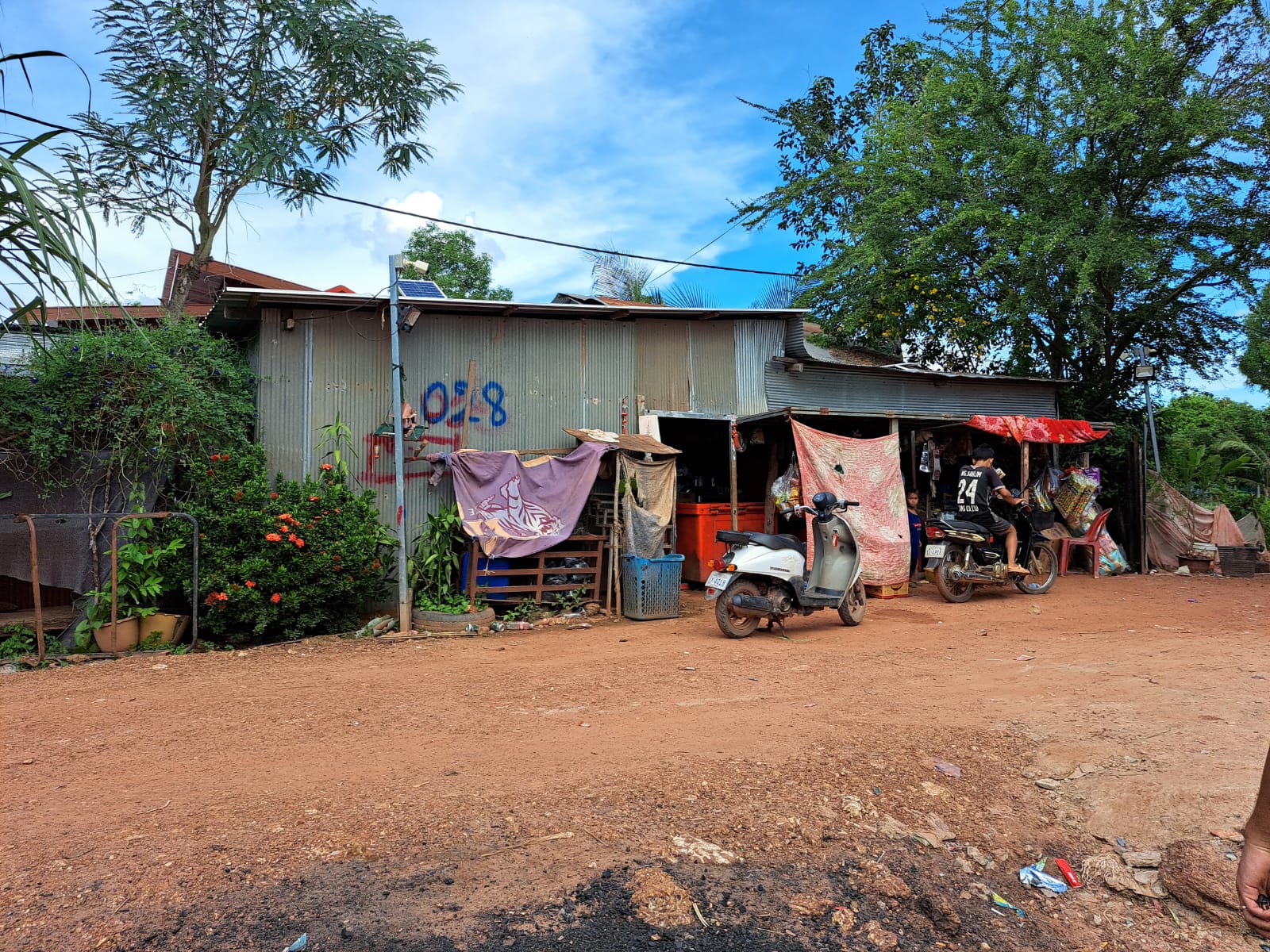
As marginalised families such as Raksmey’s weigh their options on the urban fringe, international non-profits have pushed more of their own focus into the region.
More than half of Habitat for Humanity’s global network is currently working on a campaign to address inadequate housing for informal settlements across the Asia-Pacific, from Nepal to Australia.
Much of this work is based in Southeast Asia. The organisation is doing policy work and identifying funding for housing rehabilitation in Indonesia while carrying out other major resettlement projects in Vietnam, Cambodia and Myanmar.
Pushed into an economic spiral by the 2021 military coup, Myanmar’s issues with urban poverty have become dire for many residents.
The risk of forced evictions since the military seized power has grown immensely.”
UNDP Myanmar Resident Representative Titon Mitra
“It is essential to also consider [that] low-income urban areas in Myanmar often lack basic services and infrastructure,” said UNDP Myanmar Resident Representative Titon Mitra, pointing to how many may people have to travel further and spend more money on accessing clean water. “This further squeezes already low incomes and reduces the time for work or education. In the worst cases, people may risk illness using unclean sources.”
Yangon’s urban poor are those who are facing the harsher consequences of the bloody chapter of civil war started by the coup. Although not a conflict zone, the country’s largest city is home to thousands of internally displaced persons.
With that, a January UNDP report projected Yangon’s poverty rate to triple from 13.7% in 2017 to 41.9% in 2022.
“These people often live in informal settlements too, where their homes are flimsy and impermanent, and conditions are typically squalid and cramped,” Mitra said. “What’s more, the risk of forced evictions since the military seized power has grown immensely.”
According to his experience, people living in informal settlements – many of whom have lived there for decades – may be given just a few days’ notice to dismantle their homes and move out with no offer of an alternative place to live.
People living in the city’s poorest townships earn 30% less than those in the rest of the region and are more vulnerable to a host of social issues such as violence against women, limited access to drinkable water and school dropouts of children, according to the UNDP research.
“To create sustainable solutions to decrease urban poverty, it is critical to create more opportunities for people, including work and education,” Mitra said. “There needs to be support to the private sector to create jobs and efforts to train the workforce to fill those roles.”
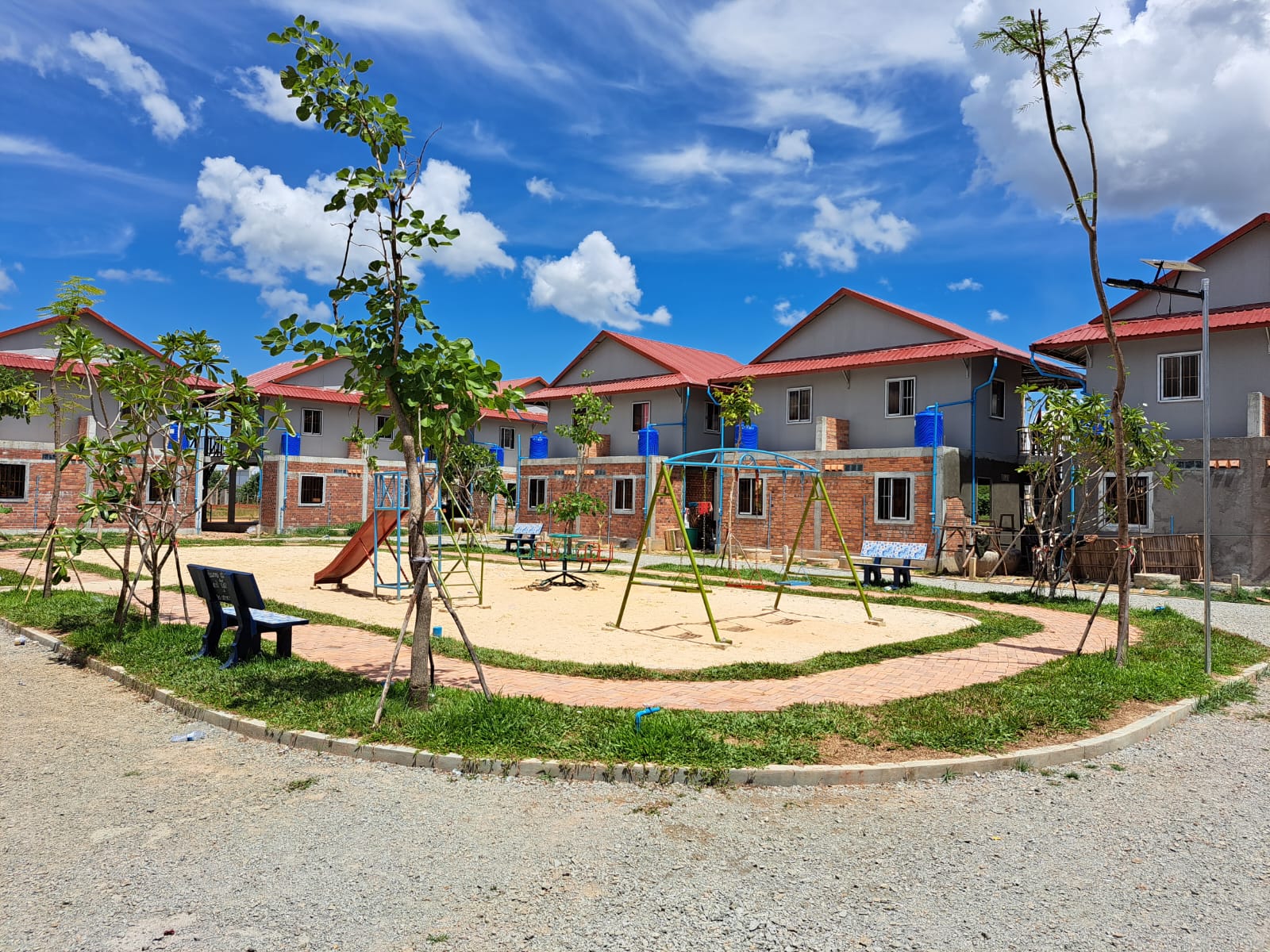
In an attempt to ease their conditions, the non-governmental organisation Step-in Step-up Academy, a delivery arm for UNDP, has been providing vocational training to Yangon youths.
Jackie Appel, the organisation’s founder, said the highest demand before the coup was usually in healthcare, office work and hospitality.
“We go out and we look for available jobs. We then create a tailored curriculum and call these very vulnerable people to join our training sessions,” Appel said. “But we cannot do this successfully without giving them food, vaccinating them, providing medical care and a stipend they can take home every month to give to their families.”
The number of trainees varies according to the job availability in Yangon and their age must be over 18. However, many families forge their children’s age in official documents to have them selected for the training.
We have to be able to get them jobs first. If there are no jobs, they can’t sustain their houses.”
Jackie Appel,, founder of Step-in Step-up Academy in Yangon
“This created another whole new area of concern,” Appel said. “But you can’t prove whether they are 18 or 14. Yet we couldn’t kick them out because they would be the perfect trafficked or exploited group of people. They’re the most vulnerable.”
Regardless of their real age, young adults have the potential to become breadwinners and support the cost of newly provided houses. But Appel also said, the potential to earn relies on opportunities being available – a factor outside a nonprofit’s control.
“Of course, these young people can sustain their own houses and their own communities,” she said. “But we have to be able to get them jobs first. If there are no jobs, they can’t sustain their houses.”
Post-coup Myanmar represents a particularly challenging landscape for international aid, but in general tight cooperation between institutions is key to successful housing improvement projects. Ensuring families can sustain themselves long-term is crucial for their well-being and that of their country, according to all the experts who spoke with the Globe.
In Cambodia, the most visible relocation project – a massive resettlement of thousands of families from Angkor Park in Siem Reap, home of the country’s historic temples – has cut a difficult path. Residents said they were forced from the park into a new zone far outside the city, away from the stream of tourists that many had relied on to make a living.
Habitat for Humanity was uninvolved with that effort, which is being handled solely by the Cambodian government. The nonprofit’s resettlement project at Veal village ensures the new residents are attached to an existing community, so the new families can integrate and work with local partners to find the support they need. The families also receive a range of training programmes, from vocational skills to family planning and basic land law.
“The lack of adequate housing in informal settlements is complex enough that no individual organisation can effectively tackle it alone,” Habitat for Humanity’s Noda said.
For resettlement at Veal, selection criteria included areas such as land ownership, household income of less than $1.90 per person a day, house size smaller than 4 square metres per person or the disability of a family member.
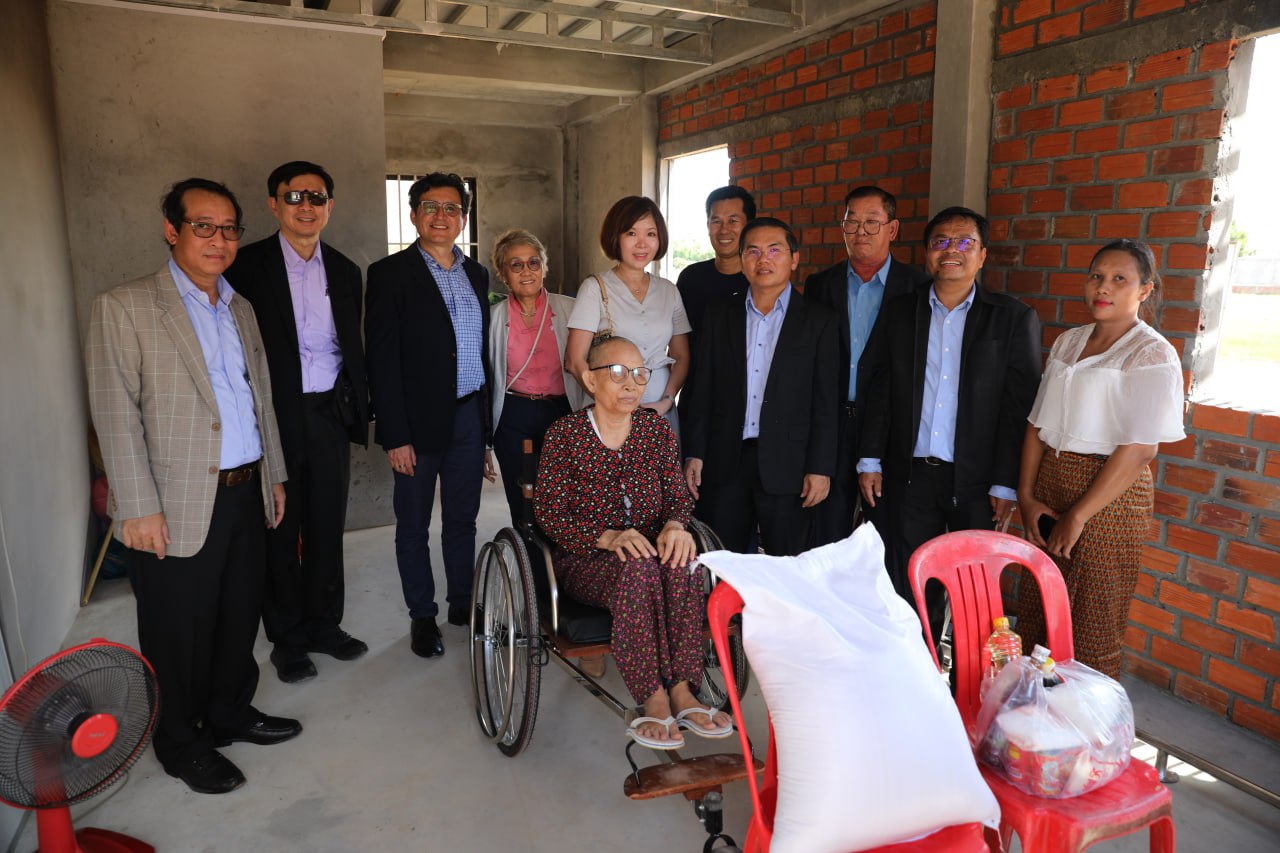
The chosen households were considered as the most vulnerable and hazardous and at high risk of living illegally on the state land, on infrastructure such as roads, canals or sewage systems. New Veal resident Lampo Leap, 35, said she was “excited” with the move.
“We no longer live in an odoured place,” Leap said. “Living along the canal was terrible. [The smell] affected our health. Living here, my mother sleeps better, and in the morning there is fresh air coming in.”
Leap is the deputy leader of the newly-built community, as well as a mother of a 10-year-old girl. She left her job at a local hotel four years ago, when her 73-year-old mother, who is now blind, started needing daily care. They have both been widows for more than a decade and have been relying on Leap’s brother’s income from his job in Thailand.
On a June afternoon in Veal, community leader Kung Sothy, 75, sat next to Leap after returning from a nearby bank to retrieve the monthly salaries for the village’s sewing group.
“While I am having a good house and permanent place to reside, I try to find more income [for my community] so that in the future we won’t face difficulty like before,” Sothy said.

